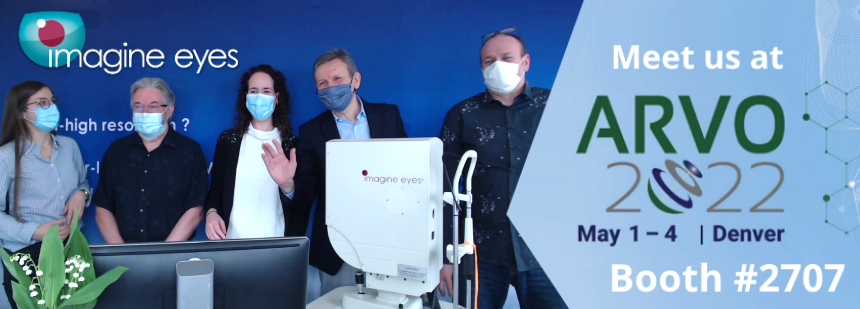ARVO 2022
Visit the ARVO 2022 virtual platform until June 30th, 2022 for accessing exhibitor and scientific program contents.
If you have planned to attend ARVO 2022 in Denver, we warmly invite you to visit Imagine Eyes’ booth #2707 and discover our latest advances in cellular-resolution retinal imaging.
New functionalities in AO imaging at ARVO 2022
This year, the rtx1 adaptive optics (AO) retinal camera comes to ARVO with several new features that extend and optimize its use in clinical studies and trials:
- Multi-acquisition workflows is a powerful functionality that streamlines imaging procedures by guiding users through every step of virtually any AO imaging protocol, including protocols for therapy trials.
- Image stitching is now fully integrated in the rtx1 software. It simplifies and accelerates image reading by automatically generating large-field montages of multiple AO images.
- Gaze-dependent imaging enables visualizations of very small drusen with unprecedented resolution and contrast.
- Shifted-beam imaging allows explorations of directional changes in photoreceptor reflectance in retinal diseases.
- Flicker stimulation enables functional assessments of neurovascular coupling in health conditions and diseases that affect small blood vessels.
- And more at booth #2707… Our experts will be there to help optimize the implementation of AO imaging in your investigations.
We’ll be happy to introduce our product with live demos, and listen to your feedback.

Presentations on Imagine Eyes’ AO imaging at ARVO 2022
This year, users of Imagine Eyes’ adaptive optics (AO) imaging systems will present new clinical findings in several retinal diseases, including AMD and IRDs, as well as studies in myopia, zoster virus and multiple sclerosis.
They will report on cellular phenotypes, structure-function relations, and surgical outcomes assessed at the photoreceptor level with rtx1 AO cameras, as well as the first investigation of a new multimodal AO-OCT technology.
To view the abstracts on the ARVO website, click on the titles below.
Poster session: “Applications of adaptive optics and advanced imaging”
Sunday May 1, 12:15 – 2:15pm US MDT
- Adaptive optics and multimodal imaging for inflammatory vitreoretinal interface abnormalities, Marie-Hélène Errera (UPMC Eye Center, USA), virtual
Poster session: “Refractive error: myopia, hyperopia, vision and models”
Monday May 2, 10:00am – noon US MDT
- Cone morphometrics and contrast sensitivity in high myopia, Mei Zhao (School of Optometry, Hong Kong), virtual
Paper session: “Advances in high resolution imaging”
Monday May 2, 12:30 – 2:30pm US MDT
- Pilot investigation of multimodal and multiscale retinal imaging technology developed by a trans-European multidisciplinary consortium, Kiyoko Gocho (National Eye Hospital, France) – in person, at 1:21pm US MDT
Paper session: “AMD Imaging”
Tuesday May 3, 10:30am – 12:30 US MDT
- Adaptive optics phenotypes of intermediate age-related macular degeneration, Ahmed Hagag (Moorfields Eye Hospital, United Kingdom) – in person, at 11:38am US MDT
Poster session: “Photoreceptors and diseases”
Tuesday May 3, 10:30am – 12:30pm US MDT
- Comparison of the photoreceptor mosaic before and after macular hole surgery with high resolution adaptive optics imaging, Paola Oquendo (University of Toronto, Canada), virtual
Poster session: “Retinal degenerations, gene therapy, transplantation, and prostheses”
Wednesday May 4, 3:00pm – 5:00pm US MDT
- Localised cone density and retinal sensitivity changes in female carriers of RPGR mutations, Danial Roshandel (Lions Eye Institute, Australia), virtual
- Phenotype heterogeneity and the association between visual acuity and outer retinal structure in a cohort of Chinese X-linked juvenile retinoschisis patients, Qingge Guo (Henan Eye Institute, China)
Poster session: “Multidisciplinary ophthalmic imaging”
Wednesday May 4, 3:00pm – 5:00pm US MDT
- Loss of cone outer-segments and thickening of photoreceptor layers in multiple sclerosis: the Belfast Eye and Multiple Sclerosis study, Stephanie McIlwaine (Queen’s University Belfast, United Kingdom), in person – F0116
- Enhanced visualization and progression tracking of gaze dependent features in adaptive optics ophthalmoscopy, Nathaniel Norberg (National Eye Hospital, France) – in person – F0389
- Adaptive optics ophthalmoscopy in retinitis pigmentosa: typical patterns, Friederike Kortuem (Universitatsklinikum Tubingen, Germany) – in person – F0118
- Adaptive optics imaging characteristics of Varicella Zoster Virus retinal segmental periarteritis, Paolo Milella (Universitaria degli Studi di Milano, Italy) – in person – F0112
- Decreased cone density in circular retinal regions at the outer edge of full thickness macular hole edema in adaptive optics imaging, Lina Chen (University of Toronto, Canada) – virtual



